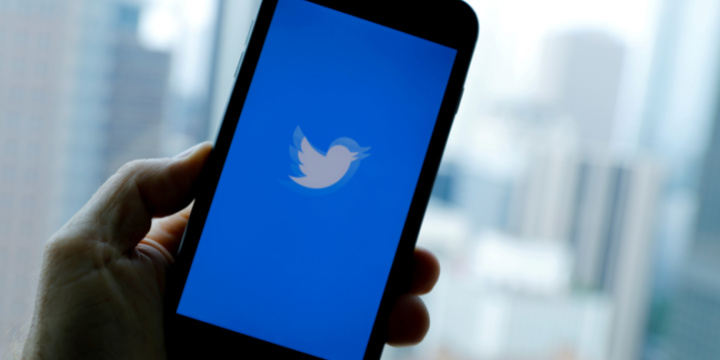The Future of Antisemitism Under a Musk-Led Twitter
 by Simon Butler
by Simon Butler

The Twitter App loads on an iPhone in this illustration photograph taken in Los Angeles, California, US, July 22, 2019. REUTERS/Mike Blake
Given Elon Musk’s laissez-faire approach to freedom of speech, the Tesla CEO’s reported $44 billion purchase of Twitter has stoked fears that Twitter will relax its already-nominal efforts to moderate antisemitism. But although this may happen, the specter of regulation could loom larger in response — albeit outside the United States.
One indication of this is the European Union’s recent message to Musk that reminded him of his regulatory obligations. That reminder, from EU Commissioner for the Internal Market Thierry Breton, suggested that Musk is not above compliance with rules on the continent requiring moderation for hate speech and other content illegal in member states.
In the United States, however, almost all hate speech is legal unless it incites someone to violence. And Musk has said the only restraining factor on Twitter will be US laws.
The US Congress continues to scrutinize the legal protections enjoyed by social media websites, but unless it amends the First Amendment (something impossible by modern standards), it can’t force Musk to curb speech unless it breaks existing laws.
These developments may give impetus to bills circulating in Congress such as the Protecting Americans from Dangerous Algorithms Act, championed by Reps. Tom Malinowski (D-NJ) and Anna G. Eshoo (D-CA). Aimed at social-media algorithms enabling and/or promoting extremism from terrorists, including white supremacists, the legislation may pick up speed in the wake of Musk’s acquisition of Twitter — though it’s not clear if these laws would withstand Supreme Court review.
In light of these factors, Musk — who reportedly has described himself as “socially liberal and fiscally conservative” but also has espoused libertarian concepts of a web unencumbered by regulatory burdens — may not translate his iconoclastic personality into transformative moderation change. And even if he does, he will be bound by the law, though it may allow hate speech on his platform.
Twitter did not respond to questions related to this article.
In the meantime, Jewish Twitter users, especially in Israel, should not be overly pessimistic about Musk’s purchase, especially when one considers his 2018 visit to Israel. In response to anti-Israel hate speech on his platform, it’s possible that Musk would be receptive to overtures from Prime Minister Naftali Bennett and other officials.
So far, it remains unclear what exactly Musk will do with Twitter. It’s apparent that regulators won’t let his free-speech model potentially subvert existing law, but it’s also unclear if legally protected hate speech will be allowed on his platform.
Only time will tell…
Simon Hardy Butler is a writer and editor living in New York City. During his career, he has written for publications ranging from Zagat to Adweek. His views and opinions are his own.
 Iran Sentences Rapper Toomaj Salehi to Death Over 2022-23 Unrest
Iran Sentences Rapper Toomaj Salehi to Death Over 2022-23 Unrest Netanyahu: ‘Antisemitic Mobs Have Taken Over Leading U.S. Universities’
Netanyahu: ‘Antisemitic Mobs Have Taken Over Leading U.S. Universities’ U.S. Decides Against Sanctions on IDF’s Netzah Yehuda Battalion
U.S. Decides Against Sanctions on IDF’s Netzah Yehuda Battalion Israel Says It Is Poised to Move on Rafah
Israel Says It Is Poised to Move on Rafah Israeli Hostage Hersh Goldberg-Polin Seen Alive in a New Hamas Video
Israeli Hostage Hersh Goldberg-Polin Seen Alive in a New Hamas Video Palestinian Prime Minister Announces New Reform Package
Palestinian Prime Minister Announces New Reform Package France: Man Suspected of Abducting, Raping Jewish Woman ‘to Avenge Palestine’
France: Man Suspected of Abducting, Raping Jewish Woman ‘to Avenge Palestine’ Israel Intensifies Strikes Across Gaza, Orders New Evacuations in North
Israel Intensifies Strikes Across Gaza, Orders New Evacuations in North Iran Threatens to Annihilate Israel Should It Launch a Major Attack
Iran Threatens to Annihilate Israel Should It Launch a Major Attack ‘Completely Baseless’: Reports of Mass Graves at Gaza Hospitals are False, IDF Says
‘Completely Baseless’: Reports of Mass Graves at Gaza Hospitals are False, IDF Says



 Iran Sentences Rapper Toomaj Salehi to Death Over 2022-23 Unrest
Iran Sentences Rapper Toomaj Salehi to Death Over 2022-23 Unrest Israeli Hostage Hersh Goldberg-Polin Seen Alive in a New Hamas Video
Israeli Hostage Hersh Goldberg-Polin Seen Alive in a New Hamas Video Israel Says It Is Poised to Move on Rafah
Israel Says It Is Poised to Move on Rafah U.S. Decides Against Sanctions on IDF’s Netzah Yehuda Battalion
U.S. Decides Against Sanctions on IDF’s Netzah Yehuda Battalion Netanyahu: ‘Antisemitic Mobs Have Taken Over Leading U.S. Universities’
Netanyahu: ‘Antisemitic Mobs Have Taken Over Leading U.S. Universities’